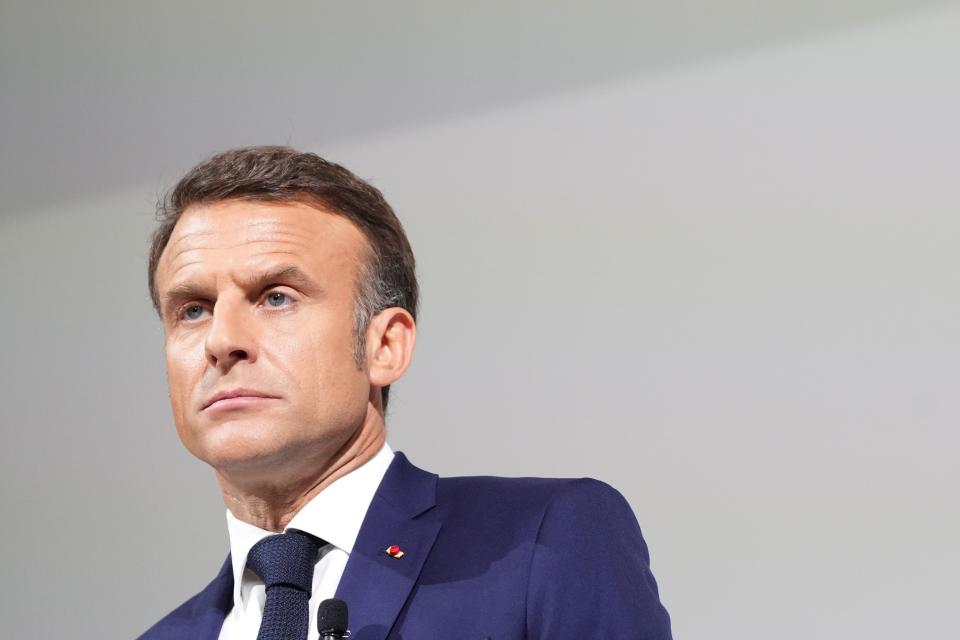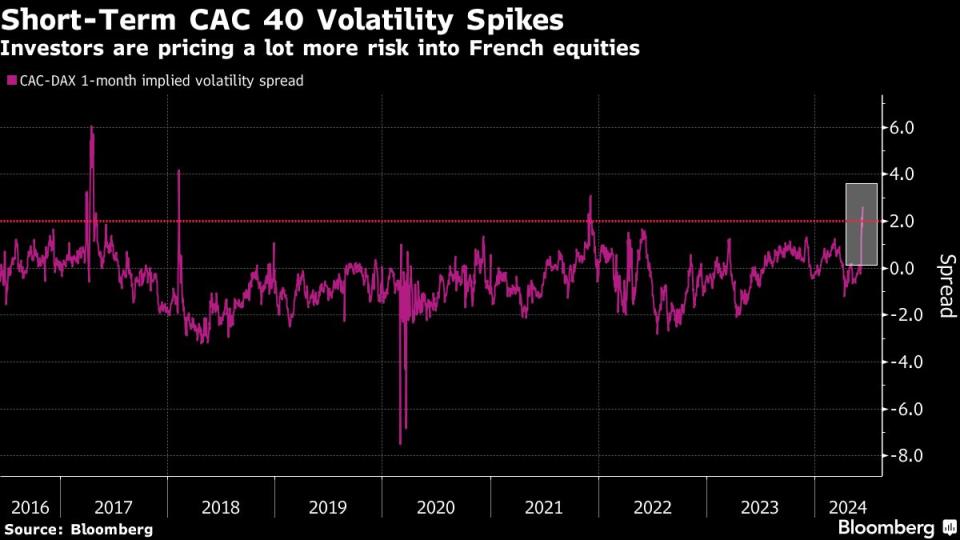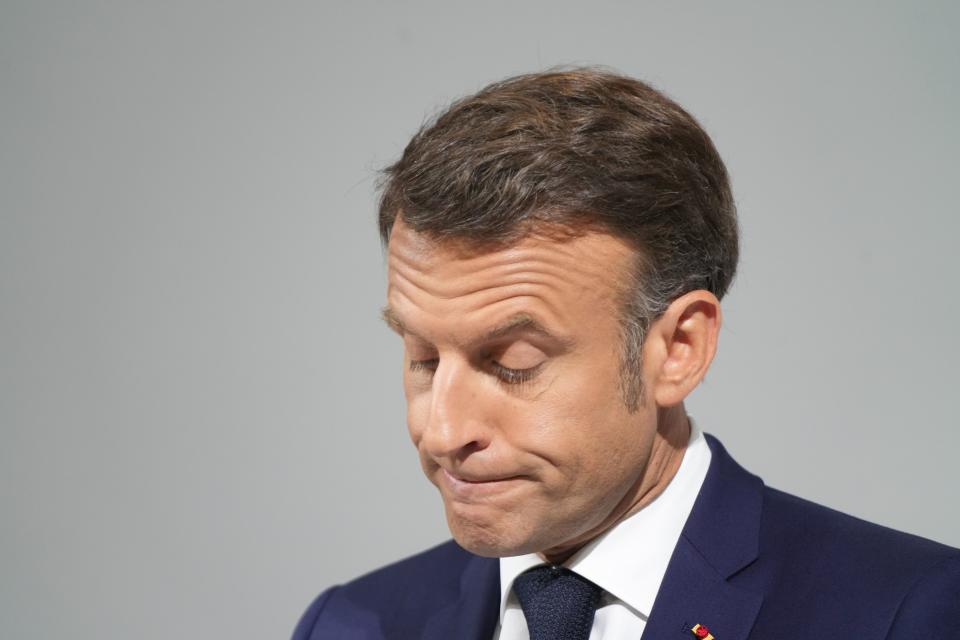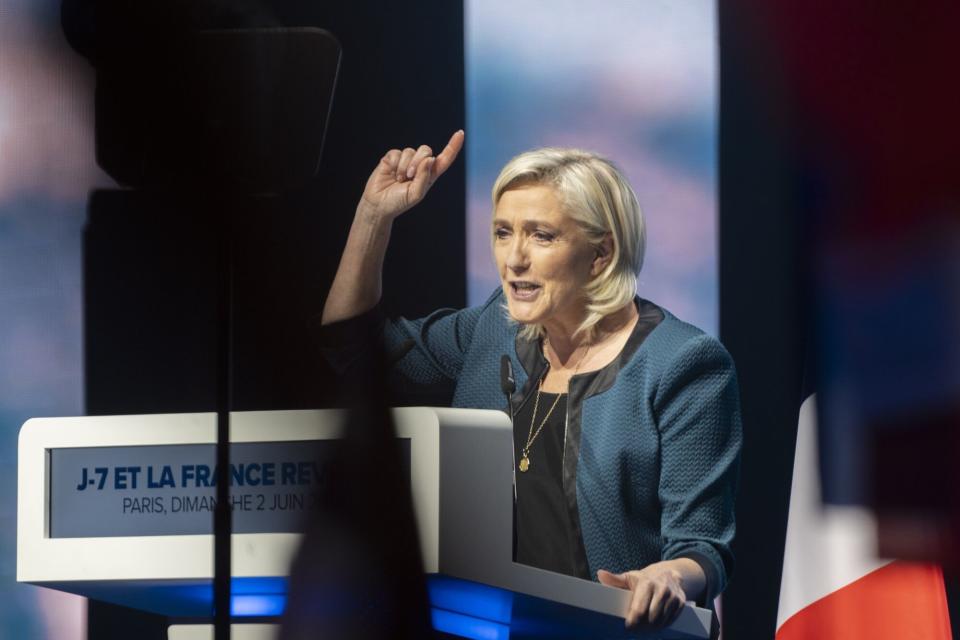Macron’s Approval Falls to the Lowest Level Since Late 2018
(Bloomberg) -- French President Emmanuel Macron’s approval rating fell to its lowest level in 5 1/2 years, according to a poll carried out after he called a snap vote in response to defeat in European elections, deepening the country’s political turmoil.
Most Read from Bloomberg
Wells Fargo Fires Over a Dozen for ‘Simulation of Keyboard Activity’
Tesla Investors Get Behind Musk’s Fight for $56 Billion Pay Deal
Apple to ‘Pay’ OpenAI for ChatGPT Through Distribution, Not Cash
Hunter Biden Was Convicted. His Dad’s Reaction Was Remarkable.
Tech Powers Stocks as Adobe Surges in Late Trading: Markets Wrap
The survey by Elabe for daily Les Echos showed that 24% of people interviewed trust Macron to tackle the problems France faces, down 5 points from May.
The poll result indicates an increased likelihood that Marine Le Pen’s far-right National Rally will finish first in the legislative ballot later this month. Winning would likely hand Le Pen’s party the premiership and give it leverage in forming a new cabinet, including more influence in economic policy.
The pollster surveyed 1,502 adults online on Tuesday and Wednesday. The margin of error was about 2.2 points.
Macron dissolved the National Assembly on Sunday and announced a two-round legislative ballot on June 30 and July 7. This came after his political group was trounced by National Rally in European Parliament elections.
French equity markets were hit, with the CAC 40 index falling 2%, increasing its losses on the week to 3.7%, on track for its worst week in nearly a year. Banks fell the most, with Societe Generale SA and BNP Paribas SA down 12% and 10% on the week.
The spread between French and German 10-year yields widened seven basis points to 68 basis points, the most since 2017 on a closing basis. The moves extended a sharp selloff that’s coincided with a surge of activity in the bond futures market. Investors now hold the largest number of 10-year futures positions in at least a year, according to data from the Eurex exchange, a move that — when coupled with the market action — points to rising short wagers.
France is at risk of losing its crown as the largest equity market in Europe in part because of the political turmoil brought on by the snap election. The French market surpassed the UK to reach the top spot less than two years ago, but investors have dumped the nation’s stocks and bonds this week in the wake of Macron’s decision. They’re fretting that the public finances will weaken further if Macron’s party loses ground in the vote.
Stocks in France were worth $3.29 trillion as of Wednesday’s close, while the UK has clawed its way back to $3.22 trillion, and the gap narrowed further on Thursday.
Macron decided to trigger a parliamentary vote in an effort to regain the political initiative after the European election. But many lawmakers and officials say the high-risk strategy is more likely to consolidate his party’s losses and undermine any remaining prospects for advancing his economic agenda, while there’s a chance it could even hand Le Pen’s group control.
Following Sunday’s vote, Macron said that the seriousness of the threat from Le Pen’s party required drastic action to turn the tide. “I can’t pretend that nothing’s happened,” he said. “The rise of nationalists and demagogues is a danger not only for our nation, but also for our Europe, and for France’s place in Europe and the world.”
The strong performance of the National Rally has thrown rival parties on the right into disarray. The conservative Republicans expelled their president, Eric Ciotti, from the party after he reached out to the National Rally to discuss an alliance. Still, he has refused to step down and is contesting the decision. His case will be examined Friday, Agence France-Presse reported, citing a judicial source.
Marion Marechal, the vice president of the nationalist Reconquest party, was expelled late Wednesday, after she, too, sought to form a coalition with Le Pen, who is also her aunt. The head of the Reconquest party, Eric Zemmour, accused Marechal, of “the world record of betrayal” in an interview on BFM TV and called on her to resign from her European Parliament seat.
Le Pen has said she’s ready to work with both Marechal and the Republicans as she tries to secure a majority and impose her agenda on the president.
The National Rally is on course to win as many as 270 of the 577 seats in the National Assembly, compared with 90 to 130 for Macron and his allies, according to a projection by pollster Elabe.
As the Republicans party has been squeezed by Macron in the center and Le Pen on the right, Ciotti has shifted closer to her platform by focusing on immigration and security, and criticizing so-called woke and Islamist ideologies.
Yet, an alliance would be unthinkable for many in a party founded by Charles de Gaulle, France’s dominant post-war leader, and has historically been center-right. The recent French presidents it has produced — Jacques Chirac and Nicolas Sarkozy — have long fought against Le Pen and her father, who founded the National Rally.
Parties on the left, which formed an alliance under far-left leader Jean-Luc Melenchon ahead of the 2022 presidential election, were still in negotiations about forming a new “popular front” late on Thursday.
“We’re still talking. As long as we’re still talking, it’s not done, and as long as it’s not done, there’s always a risk we won’t get there, which would be dramatic,” Communist Party head Fabien Roussel told BFM TV. “The only thing that counts is union.”
The group, which also includes Melenchon’s France Unbowed, the Socialists and the Greens, is capable of winning the second-largest parliamentary bloc behind National Rally, according to polls.
--With assistance from James Hirai, Sagarika Jaisinghani, Phil Serafino and Samy Adghirni.
(Updates with political moves from the 12th paragraph.)
Most Read from Bloomberg Businessweek
Israeli Scientists Are Shunned by Universities Over the Gaza War
Grieving Families Blame Panera’s Charged Lemonade for Leaving a Deadly Legacy
The World’s Most Online Male Gymnast Prepares for the Paris Olympics
China’s Economic Powerhouse Is Feeling the Brunt of Its Slowdown
©2024 Bloomberg L.P.






